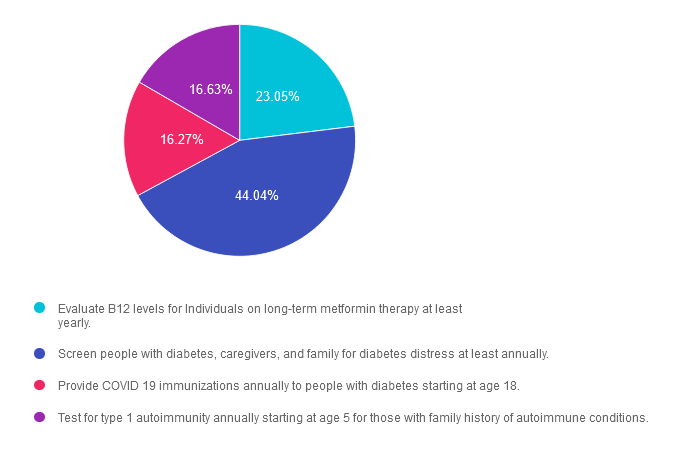
For last week’s practice question, we quizzed participants on 2024 ADA Standards. 44% of respondents chose the best answer. We want to clarify and share this important information, so you can pass it on to people living with diabetes and your colleagues, plus prepare for exam success!
Before we start though, if you don’t want any spoilers and haven’t tried the question yet, you can answer it below: Answer Question
Question:
The new ADA 2024 Standards of Care include dozens of updates to diabetes clinical practice.
Which of the following statements has actually been added to the ADA 2024 Standards of Care?
Answer Choices:
- Evaluate B12 levels for Individuals on long-term metformin therapy at least yearly.
- Screen people with diabetes, caregivers, and family for diabetes distress at least annually.
- Provide COVID 19 immunizations annually to people with diabetes starting at age 18.
- Test for type 1 autoimmunity annually starting at age 5 for those with family history of autoimmune conditions.

Getting to the Best Answer
If you are thinking about taking the certification exam, this practice test question will set you up for success. Test writers anticipate possible answers based on the details in the question. They will wave those “juicy answers” right under your nose. Your job is to weed through the particulars, pluck out the most important elements and choose the BEST answer.
Answer 1 is incorrect. 23.05% chose this answer. “Evaluate B12 levels for Individuals on long-term metformin therapy at least yearly.” This juicy answer is very tempting. It is true the metformin can be associated with lower B12 levels. However, the ADA does not recommend checking B12 levels annually for people taking this biguanide. Instead, they suggest regularly monitoring B12 levels in people on metformin therapy who have signs of B12 deficiency such as neuropathy or anemia.
Answer 2 is correct. 44.04% of you chose this answer. “Screen people with diabetes, caregivers, and family for diabetes distress at least annually.” Yes, this is the BEST answer! Many individuals with diabetes experience unrecognized and undertreated diabetes distress, which can lead to decreased engagement in self-management activities and worsen outcomes. We address diabetes distress and discuss strategies to address this common emotional response to diabetes in our ReVive 5 Training Program.
Answer 3 is incorrect. About 16.27% of respondents chose this. “Provide COVID 19 immunizations annually to people with diabetes starting at age 18.” The ADA recommends starting COVID 19 immunizations in people with diabetes starting at 6 months and follow-up with boosters as recommended,
Finally, Answer 4 is incorrect. 16.63% chose this answer. “Test for type 1 autoimmunity annually starting at age 5 for those with family history of autoimmune conditions.” Autoimmune testing is recommended for those with immediate family members with type 1 diabetes and other risk factors. There is no age cut-off nor is there a recommendation for annual testing.
We hope you appreciate this week’s rationale! Thank you so much for taking the time to answer our Question of the Week and participate in this fun learning activity!
Want to learn more about this question?
Enroll in our ADA Standards of Care Update
Airs live on February 1st, 2024, at 11:30 am PT

Objectives:
- A review of changes & updates to the annual ADA Standards of Medical Care in Diabetes.
- Identification of key elements of the position statement.
- Discussion of how diabetes educators can apply this information in their clinical setting.
Intended Audience: This course is a knowledge-based activity designed for individuals or groups of diabetes professionals, including RNs, RDs, Pharmacists, Nurse Practitioners, Clinical Nurse Specialists, Physician Assistants, and other healthcare providers interested in staying up to date on current practices of care for people with prediabetes, diabetes, and other related conditions.
Can’t make it live? No worries. We will send post the recorded version to the Online University within 24 hours of the broadcast
Instructor: Beverly Thomassian RN, MPH, CDCES, has been Board Certified in Advanced Diabetes Management for over 20 years. She is an Associate Clinical Professor at UCSF, a working educator, and a nationally recognized diabetes expert. She has a Master’s Degree in Public Health from UCLA, with a focus on behavioral health and education.
Sign up for Diabetes Blog Bytes – we post one daily Blog Byte from Monday to Friday. And of course, Tuesday is our Question of the Week. It’s Informative and FREE! Sign up below!
The use of DES products does not guarantee the successful passage of the CDCES exam. CBDCE does not endorse any preparatory or review materials for the CDCES exam, except for those published by CBDCE.









